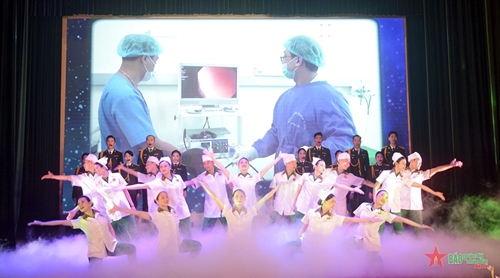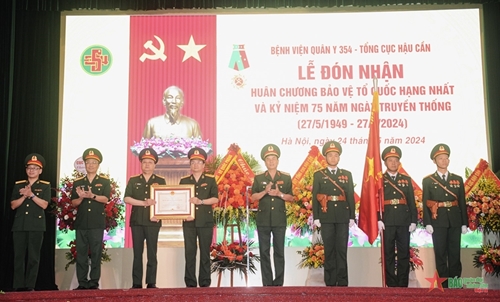Seventy five years ago, on May 27, 1949, Tran Quoc Toan Military Hospital, predecessor of Military Hospital 354, was founded in My Yen commune, Dai Tu district, Thai Nguyen province with 40 beds, 20 staff, including a doctor, and a Party cell. The clinic was assigned to care for health of cadres, personnel, and soldiers from organs of the Ministry of National Defense, and people in Viet Bac (Northernmost Vietnam) war zone. Some staff of the hospital were responsible for Party, State and military leaders’ health.
    |
 |
|
An art program at the event |
In the renovation, national industrialization and modernization process, the hospital has been upgraded. It now has 500 beds and is equipped with modern medical equipment.
The hospital has applied a lot of technical advances to diagnosis, treatment and care. It has successfully saved many deadly cases, improved the quality of examination and treatment for troops and people, and gradually become one of reliable health establishments in Hanoi, deserving to be twice awarded the title “Hero of the People’s Armed Forces.” On average, the hospital serves some 600 inpatients and gives health check-ups to 1,000 to 1,200 outpatients a day.
    |
 |
|
Military Hospital 354 receives the First-class Fatherland Protection Order. |
Addressing the event, Lieutenant General Do Van Thien, Secretary of the Party Committee and Political Commissar of the General Department of Logistics, applauded and congratulated the hospital for its proud achievements gained over the past 75 years.
To meet higher requirement in health care for troops and people, he asked the hospital to continue to build a contingent of staff firm in thought, exemplary in morality, lifestyle, and good at expertise; actively update new medical achievements at home and abroad; well combine traditional and modern medicine; and effectively exploit advanced equipment to better the care and treatment for troops and people.
The unit should also pay due attention to building a typically strong, healthy party committee and organization, a comprehensively-strong, exemplary and typical unit, promoting solidarity, strengthening relations with party committees, authorities, and people in different localities, military and civilian units; and improving the spiritual and material life of patients.
Translated by Mai Huong